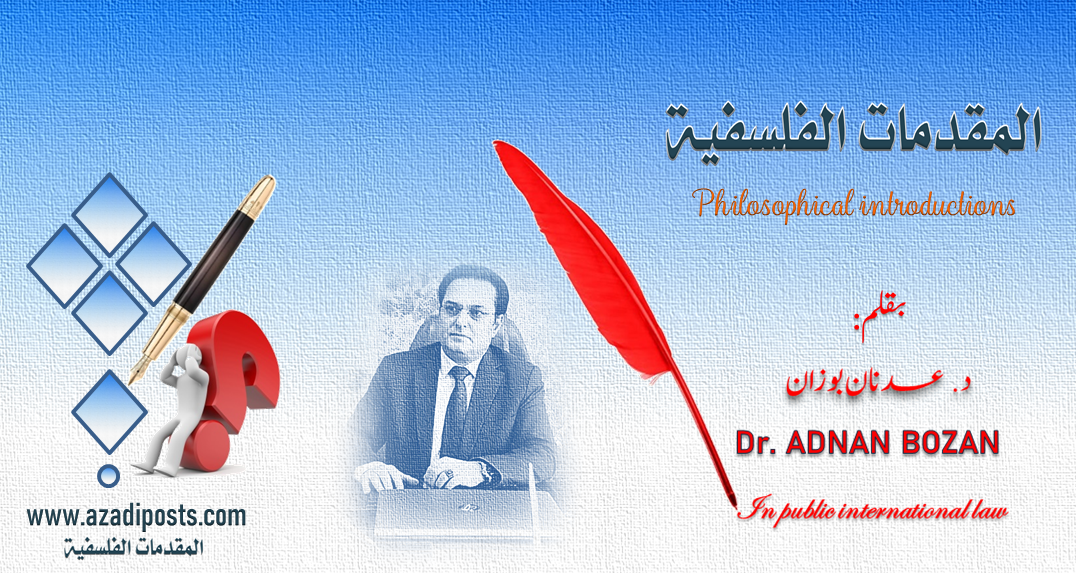To Think Is to Resist: Philosophy as an Awakening Against Blindness
- Super User
- المقدمات الفلسفية
- Hits: 3260

By Dr. Adnan Bozan
When the world becomes a noisy arena of recycled images, exhausted truths, and prepackaged solutions, philosophy emerges as the boldest act in the face of banality. Philosophy is not an intellectual luxury, nor an elitist exercise as some may believe—it is a continuous rediscovery of the self and the world, a defiant confrontation with the illusions of superficial knowledge.
To read philosophy does not mean to memorize Plato’s sayings or follow in Nietzsche’s footsteps; it means to ignite a flame within the corridors of your mind and embark on an endless journey toward truth—however confusing, painful, or unattainable it may seem.
In this sense, philosophy is not merely an academic discipline—it is the art of living deeply. To ask “Who am I?” is not to adopt a particular school of thought, but to begin an unending inner dialogue between yourself and your existence, your limits, and all that you’ve yet to contemplate. Only those who dare to question can truly touch the essence of freedom.
Thus, reading philosophy is, at its core, an act of rebellion—against conformity, indoctrination, and the prepackaged life handed to us without thought. It is a form of intellectual liberation that offers no ready answers, but instead trains you to seek them yourself, no matter how long or difficult the path.
In a time when human worth is measured by the number of "likes" received or keywords topping search engines, philosophy stands as a quiet resistance against symbolic consumption and intellectual shallowness. Philosophy is not “useful” in the utilitarian sense—but it is vital, like oxygen, for those who wish to be rather than to be consumed.
It is training in seeing beyond the surface, in listening to what remains unsaid, in unearthing what society buries beneath the noise of everyday life. In a culture ruled by “quick answers,” good questions become a revolutionary act.
Philosophical texts may be deemed difficult to understand or unsuitable for an age of speed and simplification, but in truth, this difficulty is precisely what makes them valuable. They are like mountain climbing—exhausting at first, but offering views unreachable from the plains. Philosophical writing does not provide instant gratification; rather, it builds inner resilience and sharpens your thinking, like fire tempers metal.
Over time, you come to realize the difficulty was never in the text itself, but in your own resistance to depth.
What we need is not only new philosophy, but new mindsets that can read philosophy. We do not need to memorize names of schools and doctrines; we must let philosophy become a mode of life—in love, in work, in politics, in being itself.
Socrates never wrote, yet he taught people how to ask questions. This is the essence of philosophy: to restore ownership of the mind to the individual.
Philosophy is also not an escape from reality, as some claim—it is perhaps the most engaged tool for grasping it. Philosophers do not live in ivory towers; they engage in battles of concepts amidst the chaos of the world.
Marx pondered the structural roots of injustice; Sartre confronted the absurdity of existence; Foucault exposed the mechanisms of power; Hannah Arendt reexamined the nature of evil.
Philosophy here is not speculation on metaphysics but a weapon for approaching the invisible in the everyday, and for imagining change where stagnation reigns.
Philosophy teaches us not to submit. To question when we are told to stay silent. To doubt when we are expected to obey. To dig beneath the words rather than settle for the surface.
In a world hurtling forward without pause, philosophy demands we slow down. In an age where falsehood thrives, philosophy seeks the truth—not as a conclusion, but as an open path toward the unknown.
Thus, when we read philosophy, we are not merely reading books—we are rewriting our relationship with the world, with ourselves, with existence itself.
Philosophy is not the privilege of elites; it is a necessity for anyone who refuses to live with half a mind. It is not cultural luxury, but existential urgency in the face of collective blindness.
For the one who does not think does not own himself. And the one who never questions will never know if the life he is living is truly his—or merely a prefabricated version handed to him.
Therefore, reading philosophy is not a hobby—it is resistance. It is not a lesson—it is awakening. It is not indulgence—it is a second birth.
Philosophy is not what is spoken in lecture halls—it is what ignites your consciousness. It is the refusal to be led, and the decision to be free—not with the freedom of slogans, but with the freedom of deep thought.
And when this flame awakens in your mind, you will realize that the greatest philosophical question has yet to be asked...
And it is you who must ask it.


